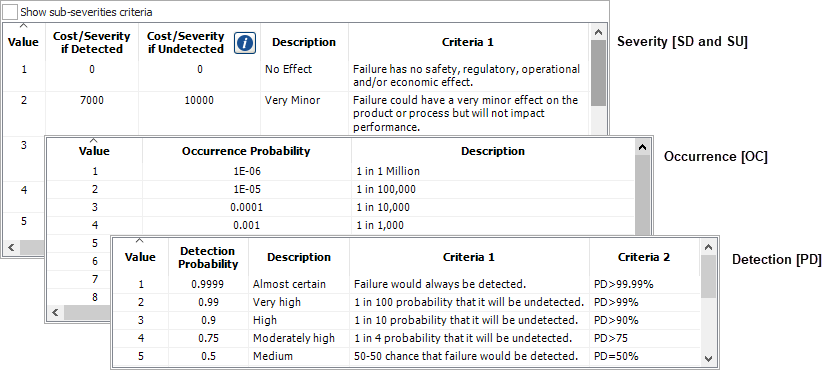Quantitative Consequence Priority Numbers (QCPNs)
The Quantitative Consequence Priority Number (QCPN) is based on quantitative values associated with each rating in the severity, occurrence and detection rating scales.
- OC = Probability that the failure will occur (0 <OC =1)
- PD = Probability that the failure will be detected (0 <PD =1)
- SD and SU = Cost / impact / consequence / severity if the failure occurs and is either detected (SD) or undetected (SU). This can be any value => 0. It may be greater if the failure is undetected. (SD => 0, SU => 0 and SD <= SU)
QCPN = OC [PD x SD + (1 - PD) x SU]
If you use actual dollar amounts for severity, the QCPN metric will reflect the total expected cost for each issue.
Since this value is quantitative, it can be rolled up to the item level as a summation.
Enabling and Showing the QCPN Metrics
Similar to other RPN metrics, there are two requirements to configure a project to enable QCPN calculations. (See Configure Projects for RPN Metrics.)
- Select or create the appropriate severity, occurrence and detection rating scales. For QCPN calculations, the scale must include appropriate quantitative values for all ratings, as discussed below.
- Enable at least one of the metrics in the project's interface style. For QCPN calculations, you must enable at least S, O, D and QCPN on the FMEAs > RPNs page.
QCPNs can be displayed in the FMEA hierarchy, the filtered view and in customized queries and reports.
Quantitative Values for Rating Scales
The QCPN calculations are based on the quantitative values associated with each rating in the Severity, Occurrence and Detection scales defined for the current project. As an example, the following picture shows portions of three rating scales that were set to meet the needs of a particular project. Your organization can choose different scales or configure the values to fit your particular products and processes.
In this example, an effect rated S = 2 is expected to cost $7,000 if detected or $10,000 if undetected. The probability of occurrence for a cause rated O = 2 is 1 in 100,000 (0.00001). The probability of detection for a cause rated D = 2 is 99 out of 100 (.99). And so on. Therefore, if the S = 2, O = 2 and D = 2, the calculated QCPN would be:
QCPN = 0.00001 [0.99 x 7000 + 0.01 x 10000] = 0.0703
